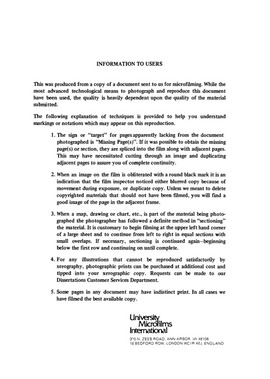| dc.contributor.author | Rice, George Kendell, | en_US |
| dc.date.accessioned | 2013-08-16T12:28:03Z | |
| dc.date.available | 2013-08-16T12:28:03Z | |
| dc.date.issued | 1980 | en_US |
| dc.identifier.uri | https://hdl.handle.net/11244/4730 | |
| dc.description.abstract | Campbell and Stanley's Recurrent Institutional Cycle Design was applied to the law school setting. The design combined the longitudinal and cross-sectional approaches. | en_US |
| dc.description.abstract | The implications of this study indicate that university administrators need to be aware of the influence institutional learning climate exerts on students. The enhancement of scholastic achievement and the improvement of student functioning may be, in part, dependent upon an administrator's ability to observe, analyze and alter learning climate. | en_US |
| dc.description.abstract | The Mann-Whitney U test and the Wilcoxon Matched-Pairs Signed Ranks Test were used to analyze data associated with functional groups 1 and 2. The Spearman Rank Correlation Coefficient measured the relationship between variables included in hypotheses associated with function 3. | en_US |
| dc.description.abstract | The site for the study was the School of Law of a small private university in Southwestern United States. The population of the study consisted of all 210 full-time male students from each of the law classes enrolled in the day division. | en_US |
| dc.description.abstract | Significant relationships between learning climate and student satisfaction were found in two of the five law school groups analyzed separately. Significant correlations resulted between learning climate measets and alienation scales within each law class. Powerlessness, as a sense of alienation, was significantly associated with student dissatisfaction. The first year students' sense of social estrangement was inversely related to relatively lower scholastic achievement. | en_US |
| dc.description.abstract | Contemporary law students have expressed concern about certain legal education practices and pedagogical techniques. Student adjustment and scholastic achievement may be affected by the learning climate of the law school. University administrators are challenged with the opportunity to continually evaluate each phase of the educational process to assure maximum student functioning. Therefore, the purpose of this study was to investigate the learning climate of a law school and to measure the relationship between that climate and student satisfaction and alienation. | en_US |
| dc.description.abstract | The literature review prompted the investigation of ten hypotheses functionally grouped into the following categories: (1) observation of perceptual and affective changes among first year law students; (2) discovery of differences between the three law school classes on measures of learning climate, satisfaction and alienation; and (3) investigation of the relationships between learning climate, satisfaction, alienation and scholastic achievement. | en_US |
| dc.description.abstract | The existence of multiple climates within a law school was not observed. It was concluded that the law school climate was relatively homogeneous within the organization as perceived by students. New law school students reported significantly higher overall satisfaction levels than either second or third year students. Results supported the proposed existence of an inverse relationship between length of attendance and student dissatisfaction. No significant differences in alienation levels were discovered between law school classes. | en_US |
| dc.description.abstract | The data was analyzed through the application of SPSS on an IBM 370 Model 148 computer. | en_US |
| dc.description.abstract | The lack of significant and consistent differences between groups required the researcher to conclude that there were no significant changes in learning climate perceptions, student satisfaction with the learning process, or student alienation during the first year of law school. | en_US |
| dc.format.extent | vi, 186 leaves : | en_US |
| dc.subject | Education, Administration. | en_US |
| dc.title | Learning climate and the satisfaction and alienation of law students. | en_US |
| dc.type | Thesis | en_US |
| dc.thesis.degree | Ph.D. | en_US |
| dc.thesis.degreeDiscipline | Jeannine Rainbolt College of Education | en_US |
| dc.note | Source: Dissertation Abstracts International, Volume: 41-03, Section: A, page: 0881. | en_US |
| ou.identifier | (UMI)AAI8018933 | en_US |
| ou.group | Jeannine Rainbolt College of Education | |
